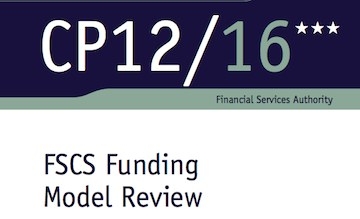The Financial Services Authority has said the changes could reduce the likelihood of interim levies and offer firms more certainty about the level of fees they pay.
The FSA said it was 'absolutely vital' to have a compensation scheme in place but was aware of the sizeable levies for certain funding classes since the launch of the funding model in 2008. Earlier this year, Financial Planners and investment intermediaries had to pay out £60m for the failures for firms such as Keydata and MF Global.
The FSA said the main proposals were:
• Two separate approaches for funding FSCS' costs, one for activities it expects will be subject to the Prudential Regulation Authority's (PRA) funding rules for the FSCS, such as deposit takers and insurance providers, and one for the other activities it expects will be subject to the Financial Conduct Authority's (FCA) funding rules. There would be no cross-subsidy between the two;
• No changes to the current funding classes;
• A retail pool made up of all classes it expects to be subject to the FCA's funding rules which would be triggered if one or more FCA classes reached their annual threshold (that is, the limit that funding class would be expected to contribute in any one year);
• Revised annual thresholds based on assessments of affordability, and;
• The FSCS to consider potential compensation costs expected in the 36 months following the levy instead of 12 months as is currently the case (except for the deposit class). This should smooth the impact of levies and may make levy requirements more predictable than now.
Sheila Nicoll, FSA director of conduct policy, said: "A viable compensation scheme is essential to financial services- investors and savers need to have confidence. The industry can agree on that, but as soon as it comes to discussions about funding, all such agreement immediately breaks down.
"Compensation funding inevitably means that different sectors have competing interests. Our role has been to walk the middle ground and produce a workable solution that we believe the entire industry can afford and live with."
She urged firms to respond to the proposals by 25 October.
• Want to receive a free weekly summary of the best news stories from our website? Just go to home page and submit your name and email address. If you are already logged in you will need to log out to see the e-newsletter sign up. You can then log in again.

